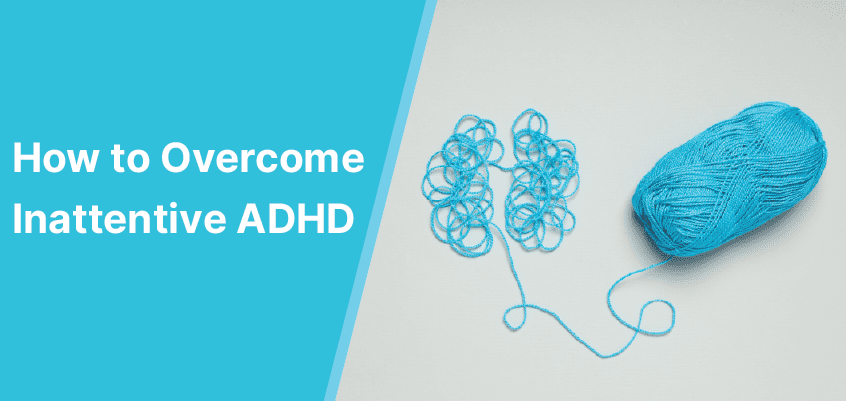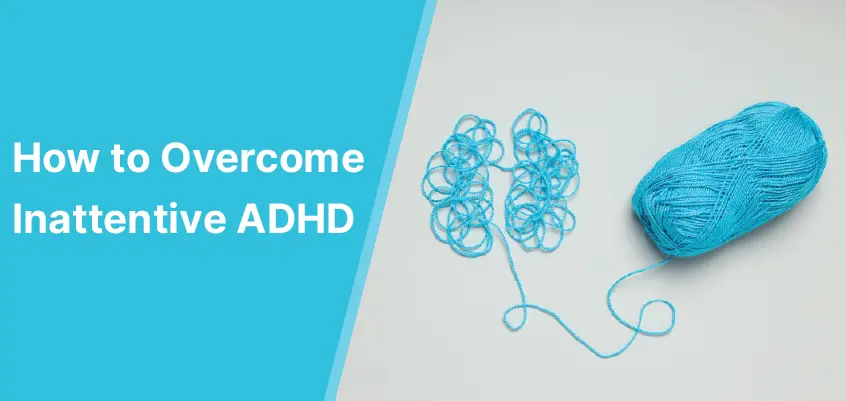
Introduction
Attention deficit hyperactive disorder is a neurodevelopmental disorder. ADHD conditions affect both children and adults. It often begins in early childhood and, in some cases, can continue to exist in adulthood as well. Symptoms of ADHD include difficulties with attention, hyperactivity, and impulsiveness. To diagnose this condition, healthcare providers usually use the guidelines of DSM-5( Diagnostic Statistical Manual edition-5).
According to DSM-5 guidelines, ADHD is presented in three kinds, inattentive type, hyperactivity or impulsivity type, and third is combined type.
Inattentive type ADHD is one subtype of ADHD characterized by symptoms such as difficulty sustaining attention, forgetfulness, and disorganization.
What is Inattentive ADHD

The predominantly inattentive type of ADHD is a kind of ADHD. People with inattentive ADHD find it difficult to concentrate, get easily distracted, and face difficulty completing tasks. They may also need help with following instructions and forgetfulness. These symptoms can significantly impact daily life, including school, work, and social interactions. Currently, there’s no cure for ADHD, but early diagnosis and a combination of medication and behavioral therapy can help in successful treatment.
Symptoms of Inattentive ADHD
Symptoms of inattentive ADHD include:
- Experience trouble with attention to detail and needing to be more focused. Experiencing issues with focus and concentration. It leads to miss attention to detail.
- In inattentive ADHD, concentrating on tasks is difficult, resulting in procrastination and reduced activity.
- A person with inattentive ADHD easily gets bored with repetitive or routine activities.
- Need help to learn new information, which can impact performance in school or work.
- Keeping track of necessary items is difficult, resulting in forgetfulness and affecting organizing and completing tasks.
- In the case of an attentive type of ADHD, experiencing confusion and daydreaming is evident, which interferes with daily tasks.
- Not seeming attentive when directly spoken to is often mistaken for disinterest or rudeness.
- Need help with following instructions, leading to errors and misunderstandings.
- Processing information slower with increased errors than peers, resulting in frustration and self-doubt.
Suppose you or someone you know is experiencing these symptoms. In that case, seeking help from a healthcare professional who can diagnose properly and recommend appropriate treatment options is essential. With the proper support, individuals with inattentive type ADHD can learn to manage their symptoms and improve their quality of life.
Read more about -ADHD and Depression
Causes of Inattentive ADHD
Inattentive ADHD is a condition that causes a person’s ability to focus and makes them very much vulnerable to distractibility, affecting their potential to complete daily tasks.
- Studies have shown that ADHD runs in families, indicating a possible genetic link, so genetics is one of the leading causes of ADHD.
- If the mother during pregnancy is doing drugs or any exposure to lead can lead to ADHD in children. Low birth weight, premature birth, and poor nutrition may also increase the risk of developing ADHD.
- Consumption of alcohol during pregnancy can also contribute as a cause of ADHD symptoms in children.
Read more about -How to manage effectively manage High Functioning ADHD in daily life.
Diagnosis of Inattentive ADHD
A doctor will closely observe your behavior. To make an accurate diagnosis for inattentive type ADHD, you should display a minimum of six out of the nine typical symptoms like:
- Often fails to give close attention to details or make careless mistakes.
- Often has difficulty sustaining attention in tasks.
- Often does not seem to listen when spoken to directly.
- Often does not follow through on instructions and fails to finish work.
- Often has difficulty organising tasks and activities.
- Often avoids dislikes or is reluctant to engage in tasks that require sustained mental efforts.
- Often loses things necessary for tasks or activities.
- Is often easily distracted by extraneous stimuli.
- Is often forgetful in daily activities.
Treatment of Inattentive ADHD
There’s no cure for ADHD, but combining medication with behavioral therapy can help treat the symptoms.
Medication of Inattentive ADHD
Majorly psychostimulant and non-stimulant medicines are helpful in treating the symptoms of inattentive ADHD. It is necessary to consult a doctor before starting the medication treatment approach. These medicines may help you deal with the symptoms of inattentive ADHD, like it reduces impulsivity and help in improving attention. But, medicines are not the permanent solution for ADHD.
Therapies of Inattentive ADHD
Behavior Therapy: Behavior therapy is helpful in the treatment of ADHD. Behavior therapy helps in the management of behaviors. In behavior therapy, rewards are used to encourage new behavior, like praising them for showing improvement. Also, implementing a behavior chart to reinforce positive behavior can be beneficial.
Social Skills Training: Social skills training helps the kid to understand how to behave in social settings and also let them understand the consequences of their behavior on others.
Cognitive Behavior Therapy: Cognitive behavior therapy is a form of talk therapy that helps to remove the distorted thinking that is affecting the behavior and tries to help you by providing alternative helpful thoughts and behavior
Conclusion
Inattentive type ADHD is a subtype of ADHD with problems focusing on a task, forgetfulness, difficulty concentrating, and difficulty learning new skills. Seeking professional help can help you accurately diagnose the condition. A combined medication and therapy approach can help in treating the symptoms.
For more information on ADHD you can visit United We Care, a mental wellness platform.
References
[1]“ADHD inattentive type in adults: Symptoms, diagnosis & treatment,” Cleveland Clinic. [Online]. Available: https://my.clevelandclinic.org/health/diseases/15253-attention-deficit-disorder-without-hyperactivity-add-in-adults. [Accessed: 16-May-2023].
[2] Dodson and LF-APA, “What is inattentive ADHD? ADD symptoms, causes, treatment,” ADDitude, 28-Nov-2016. [Online]. Available: https://www.additudemag.com/slideshows/symptoms-of-inattentive-adhd/. [Accessed: 16-May-2023].
[3] Roth, “Understanding ADHD inattentive type,” Healthline, 04-Dec-2018. [Online]. Available: https://www.healthline.com/health/adhd/inattentive-type. [Accessed: 16-May-2023].





